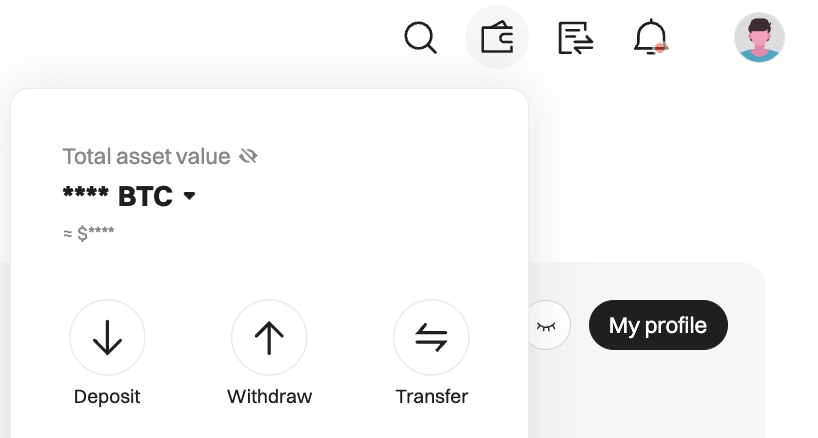
How to buy Bitcoin (BTC) in Lesotho

Simple 3-step guide to buying BTC today in Lesotho
Step 1: Create a free account on the Bitget website or the app
Step 2: Place an order for Bitcoin using a payment method of your choice:
Buy Bitcoin with a debit/credit card
For Visa or Mastercard, select Credit/Debit card, then click Add New Card under the "Buy" tab Credit/Debit in the Buy Crypto tab of the Bitget app
Credit/Debit in the Buy Crypto tab of the Bitget app Credit/Debit in the Buy Crypto tab of the Bitget websiteSelect your preferred fiat currency, enter the amount you wish to spend, link your credit card, and then complete your payment with zero fees.
Credit/Debit in the Buy Crypto tab of the Bitget websiteSelect your preferred fiat currency, enter the amount you wish to spend, link your credit card, and then complete your payment with zero fees. Add a new card to complete your payment on the Bitget app
Add a new card to complete your payment on the Bitget app Enter your bank card details to complete your payment on the Bitget websiteFor Diners Club/Discover card, click Buy Crypto > [Third Party] in the top navigation bar to place your Bitcoin order.How to buy crypto with credit/debit card
Enter your bank card details to complete your payment on the Bitget websiteFor Diners Club/Discover card, click Buy Crypto > [Third Party] in the top navigation bar to place your Bitcoin order.How to buy crypto with credit/debit cardBuy Bitcoin with Google Pay or Apple Pay
Converting your Google Pay and Apple Pay balance into Bitcoin is easy and secure on Bitget. Simply click Buy Crypto > [Third Party] in the top navigation bar to place your Bitcoin order.How to buy crypto via third-party gatewayBuy {0} with bank transfer
We accept various payment methods, including iDeal and SEPA for EUR, PIX for BRL, PayID for AUD, UPI for INR, QRIS, DANA, and OVO for IDR, SPEI for MXN, and GCash for PHP. These services are facilitated by Alchemy Pay, Banxa, Mercuryo, and Simplex payment gateways. Simply select Buy Crypto > [Third Party] in the top navigation bar and select a fiat currency to place your Bitcoin order.Buy Bitcoin with the fiat balance in your Bitget account
You can Deposit fiat funds using Advcash, SEPA, Faster Payments, or PIX payment gateways to top up your Bitget fiat balance. Then, click Buy Crypto > [Cash conversion] in the top navigation bar to place your Bitcoin order.P2P trading
With Bitget P2P, you can buy crypto using over 100 payment methods, including bank transfers, cash, and e-wallets like Payeer, Zelle, Perfect Money, Advcash, and Wise. Simply place an order, pay the seller, and receive your crypto. Enjoy secure transactions with escrow protection.How to buy crypto on Bitget P2P
Step 3: Monitor Bitcoin in your Bitget spot wallet

Latest Bitcoin news
View moreBuy Bitcoin
Bitget—where the world trades Bitcoin





FAQ
How can I buy Bitcoin on Bitget?
Can I buy just $1 worth of Bitcoin?
What payment options does Bitget support for Bitcoin purchases?
Where can I find the best platform to buy Bitcoin?
Is now a good time to invest in Bitcoin?
What fees should I expect when purchasing Bitcoin?
What is the minimum BTC required to start investing in Bitget?
How many Bitcoins are still available to mine?
What is Bitcoin's share of the global money supply?
What should I do if I encounter issues while buying Bitcoin?
Buy Bitcoin in a different country
Recently added coins
Explore other crypto guidesLandlocked Lesotho, often known as the Kingdom of Lesotho, is an exclave of South Africa. South African rand (R) and Lesotho loti (L) are the country's official currencies. The total population of Lesotho is 2,180,967 (2022). It takes less than 10 minutes to buy Bitcoin(BTC) and other cryptocurrencies in Lesotho using the Bitget peer-to-peer network and other methods of crypto deposit.
English and Southern Sotho are both official languages in Lesotho. Both the Bitget website and app are available in English.
Beautiful cities like Maseru, Teyateyaneng, Mafeteng, Hlotse, and many others can be found in Lesotho. The greatest cryptocurrency trading platform in Lesotho is Bitget exchange, no matter where you are.
The climate of Lesotho is typically categorized as temperate with alpine features. The nation has warm summers and rather chilly winters. Mostly as a result of the greater elevations, temperatures tend to be lower than in other nations at comparable latitudes. The landscape consists primarily of highland plateaus, hills, and mountains. The only country in the world that is entirely over 1,000 meters in altitude is Lesotho. The highest lowest point of any nation in the globe is located there, at 1,400 meters.
Every year on October 4, Lesotho marks the day the country gained independence from the British in 1966 by celebrating Independence Day. The Maluti Mountains, Gates of Paradise Pass, Royal Palace, Maletsunyane Falls, Semonkong, and Liphofung Caves are just a few of the stunning sights in Lesotho. In Lesotho, Bitget is the most popular cryptocurrency exchange.